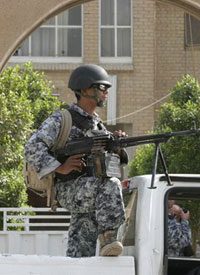
The complicated religious dynamics of Iraq have added more to the equation than the plight of Mosul’s Christian community, however. Although Mosul is situated beyond the borders of the Kurdish region, the Kurdistan Democratic Party led by Massoud Barzani gained control of Nineveh Province (of which Mosul is the capital) after Sunni Arabs, despite comprising the vast majority in the province, boycotted the provincial elections in 2005. The Kurds have signaled their intention to retain control over Mosul until they reclaim five areas in Nineveh Province. However, the central government in Baghdad wants the Kurds to relinquish control of the city.
In an effort to wrest control of Mosul from the Kurds, the Iraqi government has replaced Kurdish units of the Iraqi army in Mosul with forces under Sunni and Shiite command, has sent nearly 3,000 national policemen from Baghdad to Mosul — not only to stem anti-Christian attacks, but also to increase its strength vis-à-vis the Kurds — and is attempting to forge alliances with Sunni Arabs in Nineveh who oppose the influence of the Kurds in their province. The Iraqi Defense Ministry also recently appointed Major General Abdullah Abdul-Karim, Prime Minister al-Maliki’s brother-in-law, as the commander of the Iraqi Second Division in Mosul. These efforts have met with Kurdish resistance, however.
Sami al-Askari, one of Prime Minister Maliki’s senior advisers, expressed hope that talks between al-Maliki and Barzani would resolve the crisis. However, he reiterated his government’s position that the presence of independent Kurdish forces beyond the borders of Kurdistan was “unlawful.” He added that refusal by any Kurdish officers in the Iraqi Army to obey orders to transfer out of Nineveh would be regarded as a “mutiny that must be severely punished.”
Concerned about possible armed conflict between Kurds and a Sunni-Shiite alliance, U.S. military commanders have held a series of emergency meetings with the Iraqi central government and Kurdish officials, in an attempt to prevent in-fighting between factions of the Iraqi government, all of whom are theoretically allies in post-Hussein Iraq.
“It’s the perfect storm against the old festering background,” warned U.S. Brigadier General Raymond A. Thomas III, the military commander who oversees Nineveh and Kirkuk Provinces and the Kurdish region.
As the United States gradually turns over control of Iraq to Iraqis, on a province-by-province basis, a policy is being formulated not to interfere in ethnic or religious squabbles among Iraqis. Should the dispute between the Kurds and the central Iraqi government escalate into fighting, the American military will “step aside,” General Thomas told the Times, rather than “have United States servicemen get killed trying to play peacemaker.”
Just this past September, there was a military standoff between the Iraqi Army and Kurdish security forces, the pesh merga, in eastern Diyala Province. Fighting was only averted due to the intervention of U.S. forces. Back in 2003, the pesh merga helped American Special Forces units capture Mosul and were later integrated into the U.S. forces helping to secure the city against insurgents.
Kurdish leader Barzani recently blocked a government ministerial order to transfer 34 Kurdish officers out of Mosul, said Colonel Hajji Abdullah, a Kurdish battalion commander.
“If the Arabs do not change now, things will get worse and I see confrontation,” said Colonel Abdullah.
Abdullah and fellow officer Brigadier General Nadheer Issam, in a statement reminiscent of Robert E. Lee’s loyalty to his native Virginia, said that their primary loyalties are to Kurdistan.
“If I were made to choose, I would not even think for a second — I would leave the army,” General Issam was quoted by the Times. “We have sacrificed too much fighting [Saddam Husein’s] Baathists.”
Major Ali Naji, a Sunni Arab officer in one of the military units sent recently from Baghdad, explained the government’s strategy: “The government wants to extend its authority, and this clashes with the will and ambitions of the Kurds. I predict fighting between Iraqi forces and the pesh merga.”
Kurds and Christians in Iraq have traditionally lived peacefully alongside each other.
In the meantime, the dwindling Christian community in Mosul remains caught in the middle of the conflict. A group of Christian leaders who met with General Thomas last week in the town of Qosh, outside Mosul, blamed the conflict between the central government and the Kurds for inflaming tensions in Mosul and placing Christians there in danger. A Christian clergyman, the Rev. Bashar Warda, told General Thomas: “You have done a great job removing Saddam’s regime. Continue with removing [al-Maliki’s] regime, and start over again.”
— AP Images



